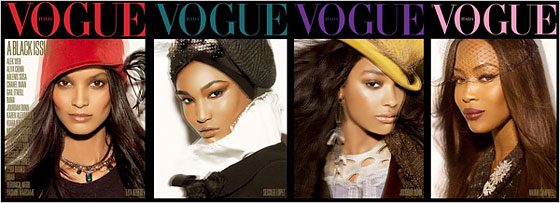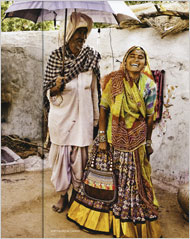Image sources: nymag.com, nytimes.
Not the freshest topic, but worth recording, Vogue India’s August’s spread has a 16 page of photo editorial with average India people wearing luxury accessories. What’s the issue with average? When 465 million of 1.1 billion Indians survive on US$1.25 a day (according to the World Bank,) having them wear US$10,000 Hermes bags and US$200 Burberry umbrellas, came off, at best, a little tacky.
New York Times quotes the Vogue India editor Priya Tanna: “Lighten up… fashion is no longer a rich man’s privilege. Anyone can carry it off and make it look beautiful… You have to remember with fashion, you can’t take it that seriously… We weren’t trying to make a political statement or save the world.”
The quote is most interesting in comparison to Vogue Italy’s July issue, dubbed the Black Issue, whose editorial was shot by Steve Meisel and only featured black models. The issue included established models such as, Alek Wek, as well as new comers, like Jourdan Dunn. The issues sold out quickly and required an unprecedented second printing. Although, I wonder if other people had my first reaction flipping through the magazine: the first half of the magazine, were mostly ads, featuring white models. The difference was striking and adds poignancy to the statement made by the Vogue Italy editors.
The problem is that the fashion industry is itself an agent of fashion, trends, and the new. 2006 was the year of eco-fashion, when Elle’s green fashion issue was the fashion magazine that made mainstream headlines. The next green issues were yesterday’s news, even if the importance of sustainability is ever present. These magazine and luxury brands are trying to sell aspiration. Clearly, magazines such as Vogue need to clarify the messages they are hoping people to aspire towards achieving. This point is especially important in a country such as India, whose struggles with balancing their raising middle and upper class with highly visible poverty. As luxury continues to grow as a global obsession, fashion and fashion publishing obviously has an obligation to consider its social responsibility, in a way that exists beyond the realm of “the moment.”





